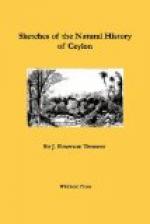Querquedula
crecca, Linn.
circia, Linn.
Fuligula
rufina, Pall.
Spatula
clypeata, Linn.
Podiceps
Philippensis, Gm.
Larus
brunnicephalus, Jerd.
ichthyaetus, Pall.
Sylochelidon
Caspius, Lath.
Hydrochelidon
Indicus, Steph.
Gelochelidon
Anglicus, Mont.
Onychoprion
anasthaetus, Scop.
Sterna
Javanica, Horsf.
melanogaster, Temm.
minuta, Linn.
Seena
aurantia, Gray.
Thalasseus
Bengalensis, Less.
cristata, Stepth.
Dromas
ardeola, Payk.
Atagen
ariel, Gould.
Thalassidroma
melanogaster, Gould.
Plotus
melanogaster, Gm.
Pelicanus
Philippensis, Gm.
Graculus
Sinensis, Shaw.
pygmaeus, Pallas.
NOTE.
The following is a list of the birds which are, as far as is at present known, peculiar to the island; it will probably be determined at some future day that some included in it have a wider geographical range.
Haematornis spilogaster. The “Ceylon eagle;” was discovered by Mr. Layard in the Wanny, and by Dr. Kelaart at Trincomalie.
Athene castonotus. The chestnut-winged hawk owl. This pretty little owl was added to the list of Ceylon birds by Dr. Templeton. Mr. Blyth is at present of opinion that this bird is identical with Ath. Castanopterus, Horsf. of Java as figured by Temminck: P. Col.
Batrachostomus moniliger. The oil bird; was discovered amongst the precipitous rocks of the Adam’s Peak range by Mr. Layard. Another specimen was sent about the same time to Sir James Emerson Tennent from Avisavelle. Mr. Mitford has met with it at Ratnapoora.
Caprimulgus Kelaarti. Kelaart’s nightjar; swarms on the marshy plains of Neuera-ellia at dusk.
Hirundo hyperythra. The red-bellied swallow; was discovered in 1849, by Mr. Layard at Ambepusse. They build a globular nest, with a round hole at top. A pair built in the ring for a hanging lamp in Dr. Gardner’s study at Peradenia, and hatched their young, undisturbed by the daily trimming and lighting of the lamp.
Cisticola omalura. Layard’s mountain grass warbler; is found in abundance on Horton Plain and Neuera-ellia, among the long Patena grass.
Drymoica valida. Layard’s wren-warbler; frequents tufts of grass and low bushes, feeding on insects.
Pratincola atrata. The Neuera-ellia robin; a melodious songster; added to our catalogue by Dr. Kelaart.
Brachypteryx Palliseri. Ant thrush. A rare bird, added by Dr. Kelaart from Dimboola and Neuera-ellia.




